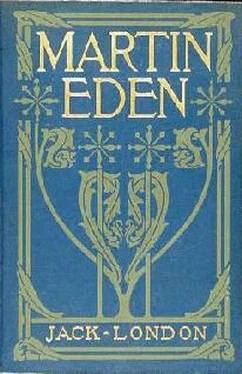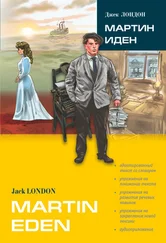He read it through to the end, carefully, a second time, then sat down and replied. He outlined the remarks he had uttered at the socialist meeting, pointing out that they were in all ways the converse of what the newspaper had put in his mouth. Toward the end of the letter he was God’s own lover pleading passionately for love. "Please answer," he said, "and in your answer you have to tell me but one thing. Do you love me? That is all-the answer to that one question."
But no answer came the next day, nor the next. "Overdue" lay untouched upon the table, and each day the heap of returned manuscripts under the table grew larger. For the first time Martin’s glorious sleep was interrupted by insomnia, and he tossed through long, restless nights. Three times he called at the Morse home, but was turned away by the servant who answered the bell. Brissenden lay sick in his hotel, too feeble to stir out, and, though Martin was with him often, he did not worry him with his troubles.
For Martin’s troubles were many. The aftermath of the cub reporter’s deed was even wider than Martin had anticipated. The Portuguese grocer refused him further credit, while the greengrocer, who was an American and proud of it, had called him a traitor to his country and refused further dealings with him-carrying his patriotism to such a degree that he cancelled Martin’s account and forbade him ever to attempt to pay it. The talk in the neighborhood reflected the same feeling, and indignation against Martin ran high. No one would have anything to do with a socialist traitor. Poor Maria was dubious and frightened, but she remained loyal. The children of the neighborhood recovered from the awe of the grand carriage which once had visited Martin, and from safe distances they called him "hobo" and "bum." The Silva tribe, however, stanchly defended him, fighting more than one pitched battle for his honor, and black eyes and bloody noses became quite the order of the day and added to Maria’s perplexities and troubles.
Once, Martin met Gertrude on the street, down in Oakland, and learned what he knew could not be otherwise-that Bernard Higginbotham was furious with him for having dragged the family into public disgrace, and that he had forbidden him the house.
"Why don’t you go away, Martin?" Gertrude had begged. "Go away and get a job somewhere and steady down. Afterwards, when this all blows over, you can come back."
Martin shook his head, but gave no explanations. How could he explain? He was appalled at the awful intellectual chasm that yawned between him and his people. He could never cross it and explain to them his position,-the Nietzschean position, in regard to socialism. There were not words enough in the English language, nor in any language, to make his attitude and conduct intelligible to them. Their highest concept of right conduct, in his case, was to get a job. That was their first word and their last. It constituted their whole lexicon of ideas. Get a job! Go to work! Poor, stupid slaves, he thought, while his sister talked. Small wonder the world belonged to the strong. The slaves were obsessed by their own slavery. A job was to them a golden fetich before which they fell down and worshipped.
He shook his head again, when Gertrude offered him money, though he knew that within the day he would have to make a trip to the pawnbroker.
"Don’t come near Bernard now," she admonished him. "After a few months, when he is cooled down, if you want to, you can get the job of drivin’ delivery-wagon for him. Any time you want me, just send for me an’ I’ll come. Don’t forget."
She went away weeping audibly, and he felt a pang of sorrow shoot through him at sight of her heavy body and uncouth gait. As he watched her go, the Nietzschean edifice seemed to shake and totter. The slave-class in the abstract was all very well, but it was not wholly satisfactory when it was brought home to his own family. And yet, if there was ever a slave trampled by the strong, that slave was his sister Gertrude. He grinned savagely at the paradox. A fine Nietzsche-man he was, to allow his intellectual concepts to be shaken by the first sentiment or emotion that strayed along-ay, to be shaken by the slave-morality itself, for that was what his pity for his sister really was. The true noble men were above pity and compassion. Pity and compassion had been generated in the subterranean barracoons of the slaves and were no more than the agony and sweat of the crowded miserables and weaklings.
"Overdue" still continued to lie forgotten on the table. Every manuscript that he had had out now lay under the table. Only one manuscript he kept going, and that was Brissenden’s "Ephemera." His bicycle and black suit were again in pawn, and the type-writer people were once more worrying about the rent. But such things no longer bothered him. He was seeking a new orientation, and until that was found his life must stand still.
After several weeks, what he had been waiting for happened. He met Ruth on the street. It was true, she was accompanied by her brother, Norman, and it was true that they tried to ignore him and that Norman attempted to wave him aside.
"If you interfere with my sister, I’ll call an officer," Norman threatened. "She does not wish to speak with you, and your insistence is insult."
"If you persist, you’ll have to call that officer, and then you’ll get your name in the papers," Martin answered grimly. "And now, get out of my way and get the officer if you want to. I’m going to talk with Ruth."
"I want to have it from your own lips," he said to her.
She was pale and trembling, but she held up and looked inquiringly.
"The question I asked in my letter," he prompted.
Norman made an impatient movement, but Martin checked him with a swift look.
She shook her head.
"Is all this of your own free will?" he demanded.
"It is." She spoke in a low, firm voice and with deliberation. "It is of my own free will. You have disgraced me so that I am ashamed to meet my friends. They are all talking about me, I know. That is all I can tell you. You have made me very unhappy, and I never wish to see you again."
"Friends! Gossip! Newspaper misreports! Surely such things are not stronger than love! I can only believe that you never loved me."
A blush drove the pallor from her face.
"After what has passed?" she said faintly. "Martin, you do not know what you are saying. I am not common."
"You see, she doesn’t want to have anything to do with you," Norman blurted out, starting on with her.
Martin stood aside and let them pass, fumbling unconsciously in his coat pocket for the tobacco and brown papers that were not there.
It was a long walk to North Oakland, but it was not until he went up the steps and entered his room that he knew he had walked it. He found himself sitting on the edge of the bed and staring about him like an awakened somnambulist. He noticed "Overdue" lying on the table and drew up his chair and reached for his pen. There was in his nature a logical compulsion toward completeness. Here was something undone. It had been deferred against the completion of something else. Now that something else had been finished, and he would apply himself to this task until it was finished. What he would do next he did not know. All that he did know was that a climacteric in his life had been attained. A period had been reached, and he was rounding it off in workman-like fashion. He was not curious about the future. He would soon enough find out what it held in store for him. Whatever it was, it did not matter. Nothing seemed to matter.
For five days he toiled on at "Overdue," going nowhere, seeing nobody, and eating meagrely. On the morning of the sixth day the postman brought him a thin letter from the editor of The Parthenon . A glance told him that "Ephemera" was accepted. "We have submitted the poem to Mr. Cartwright Bruce," the editor went on to say, "and he has reported so favorably upon it that we cannot let it go. As an earnest of our pleasure in publishing the poem, let me tell you that we have set it for the August number, our July number being already made up. Kindly extend our pleasure and our thanks to Mr. Brissenden. Please send by return mail his photograph and biographical data. If our honorarium is unsatisfactory, kindly telegraph us at once and state what you consider a fair price."
Читать дальше












